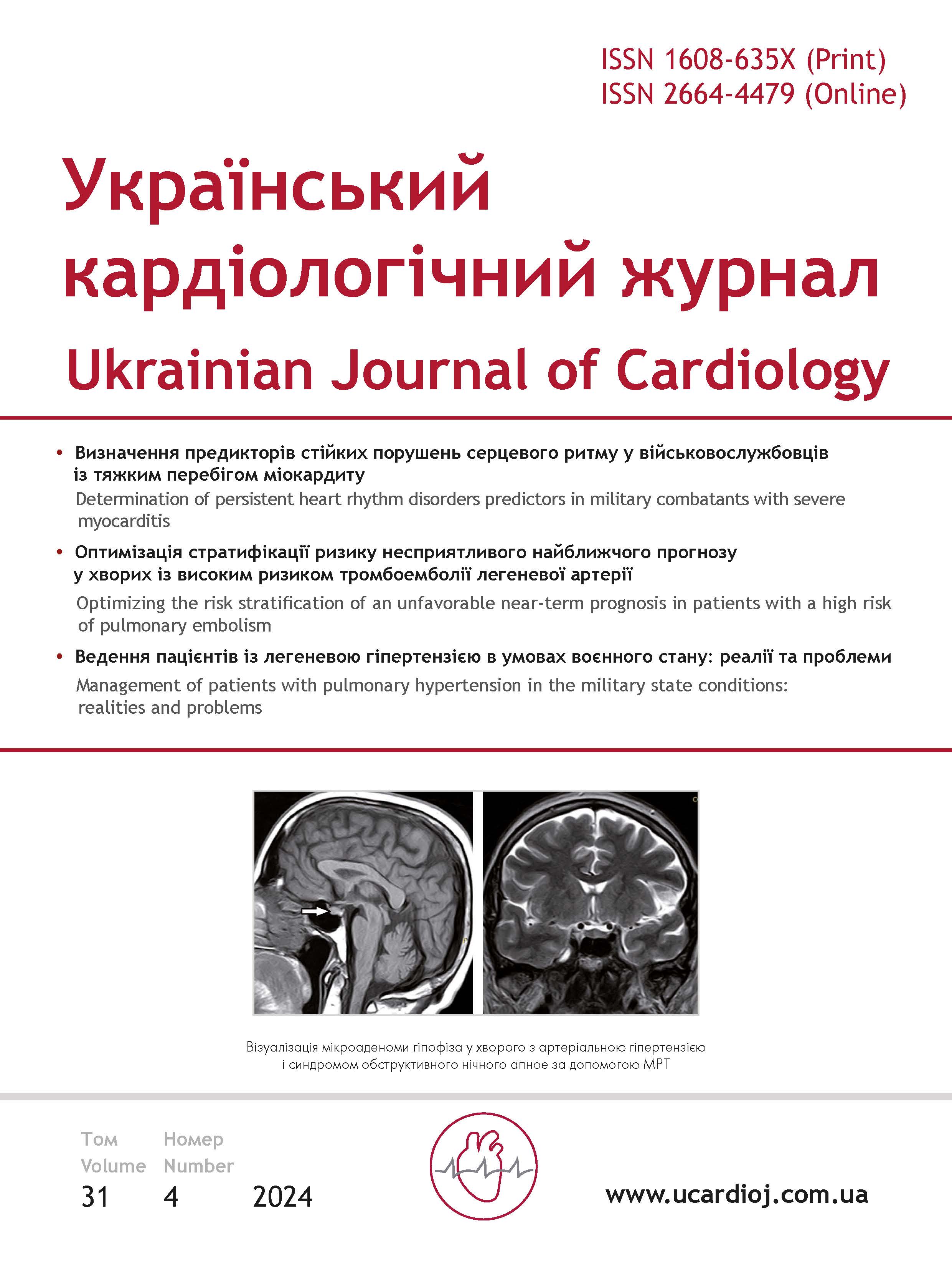Management of patients with pulmonary hypertension in the military state conditions: realities and problems
Main Article Content
Abstract
Any military actions on the territory of any country can significantly influence on the quality of medical care. Especially, it could reflect on patients with rare diseases requiring expensive treatment. In this article there were analyzed the work of the specialized pulmonary hypertension (PH) center during the period of Russia’s military invasion in Ukraine and presented the results of the outpatient survey due to problems with patient access to medical care and medicine provision in the period from 24-Feb-2022 to 01-Jul-2024 (war period).
We selected patients with a diagnosis of PH carried out for the periods: since 01-Jan-2018 until 30-Apr-2020 (pre-war and pre-COVID-19 period) and since 22-Feb-2022 until 01-Jul-2024 (war period): n=328 and n=394 respectively. The selection was made from the electronic hospital database and the electronic registry of patients that have been conducted in the department since 2014. With the help of the Google Form system, a questionnaire was created and sent through modern devices of communication (Viber, Facebook) to fill out online to patients who are registered (applied for outpatient or inpatient care) in the department or are subscribers to the social network accounts of the Ukrainian Association of Patients with Pulmonary hypertension and/or the Lviv City Charitable Foundation «Sisters of Dalili». We got 220 responses.
It was established that martial law status in the country did not significantly affect the management of patients with different forms of PH in the specialized center. The number of treated patients and performed right heart catheterization procedures increased by 20 and 22 % respectively during the «war period», compared to the «pre-war» period. 65 % of PH patients who came abroad due to the war used the help of the specialized department for direct referral to PH centers in Poland for further treatment, including surgical one. 41,7 % of respondents changed their place of residence during the war, but only 17,9 % had interruptions in taking of drugs for the PH treatment. Along with the usual sources of free medicines (humanitarian aid from charitable organizations, the government’s free medicines program), one in five patients «shared out» medicines with other patients. In 45 % of the patients who visited foreign PH centers, the therapy previously prescribed in Ukraine was changed to more effective or safer drugs that are not registered in Ukraine.
Article Details
Keywords:
References
Humbert M, Kovacs G, Hoeper MM, Badagliacca R, Berger RMF, Brida M, Carlsen J, Coats AJS, Escribano-Subias P, Ferrari P, Ferreira DS, Ghofrani HA, Giannakoulas G, Kiely DG, Mayer E, Meszaros G, Nagavci B, Olsson KM, Pepke-Zaba J, Quint JK, Rådegran G, Simonneau G, Sitbon O, Tonia T, Toshner M, Vachiery JL, Vonk Noordegraaf A, Delcroix M, Rosenkranz S; ESC/ERS Scientific Document Group. 2022 ESC/ERS Guidelines for the diagnosis and treatment of pulmonary hypertension Eur Respir J. 2023 Jan 6;61(1):2200879. https://doi.org/10.1183/13993003.00879-2022.
Atz AM, Adatia I, Wessel DL. Rebound pulmonary hypertension after inhalation of nitric oxide. Ann Thorac Surg. 1996 Dec;62(6):1759-64. https://doi.org/10.1016/s0003-4975(96)00542-5.
Lavoie, A., Hall, J. B., Olson, D. M., & Wylam, M. E. Life-threatening effects of discontinuing inhaled nitric oxide in severe respiratory failure. Am J Respir Crit Care Med. 1996 Jun;153(6 Pt 1):1985-7. doi: 10.1164/ajrccm.153.6.8665066. https://doi.org/10.1164/ajrccm.153.6.8665066.
Christenson J, Lavoie A, O’Connor M, Bhorade S, Pohlman A, Hall JB. The incidence and pathogenesis of cardiopulmonary deterioration after abrupt withdrawal of inhaled nitric oxide. Am J Respir Crit Care Med. 2000 May;161(5):1443-9. https://doi.org/10.1164/ajrccm.161.5.9806138.
McMullan DM, Bekker JM, Johengen MJ, Hendricks-Munoz K, Gerrets R, Black SM, Fineman JR. Inhaled nitric oxide-induced rebound pulmonary hypertension: role for endothelin-1. Am J Physiol Heart Circ Physiol. 2001 Feb;280(2):H777-85. https://doi.org/10.1152/ajpheart.2001.280.2.H777.
Narechania S, Torbic H, Tonelli AR. Treatment Discontinuation or Interruption in Pulmonary Arterial Hypertension. J Cardiovasc Pharmacol Ther. 2020 Mar;25(2):131-141. https://doi.org/10.1177/1074248419877409
Yamaoka-Tojo M, & Tojo T. Prevention of Natural Disaster-Induced Cardiovascular Diseases. J. Clin. Med. 2024;13(4):1004. https://doi.org/10.3390/jcm13041004.
Takahashi T, Tanaka F, Shimoda H, Tanno K, Sakata K, Takahashi S, Yonekura Y, Ogawa A, Kobayashi S, Shimooki O, Nakamura M. Five-year blood pressure trajectories of survivors of the tsunami following the Great East Japan Earthquake in Iwate. Hypertens Res. 2021 May;44(5):581-90. https://doi.org/10.1038/s41440-020-00607-9
Babaie J, Pashaei Asl Y, Naghipour B, Faridaalaee G. Cardiovascular Diseases in Natural Disasters; a Systematic Review. Arch Acad Emerg Med. 2021 May 4;9(1):e36. https://doi.org/10.22037/aaem.v9i1.1208. PMID: 34027431; PMCID: PMC8126350.
Grady D, Weiss M, Hernandez-Sanchez J, Pepke-Zaba J. Medication and patient factors associated with adherence to pulmonary hypertension targeted therapies. Pulm Circ. 2018 Jan-Mar;8(1):2045893217743616. https://doi.org/10.1177/2045893217743616.
Studer S, Hull M, Pruett J, Koep E, Tsang Y, Drake W 3rd. Treatment patterns, healthcare resource utilization, and healthcare costs among patients with pulmonary arterial hypertension in a real-world US database. Pulm Circ. 2019 Jan-Mar;9(1):2045894018816294. https://doi.org/10.1177/2045894018816294.
Shah NB, Mitchell RE, Proctor ST, Choi L, DeClercq J, Jolly JA, Hemnes AR, Zuckerman AD. High rates of medication adherence in patients with pulmonary arterial hypertension: An integrated specialty pharmacy approach. PLoS One. 2019 Jun 6;14(6):e0217798. https://doi.org/10.1371/journal.pone.0217798.
Waxman A, Chen SY, Boulanger L, Watson JA, Golden G. Factors associated with adherence to phosphodiesterase type 5 inhibitors for the treatment of pulmonary arterial hypertension. Med Econ. 2013;16(2):298-306. doi: 10.3111/13696998.2012.756399. https://doi.org/10.3111/13696998.2012.756399


